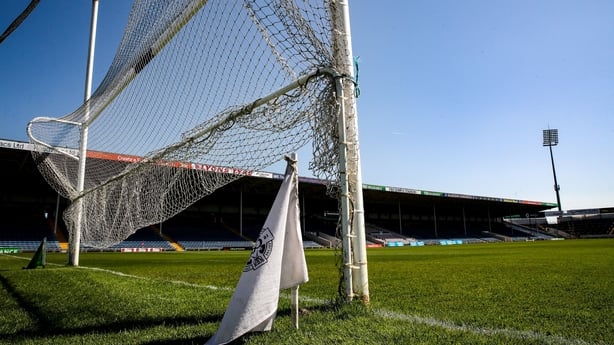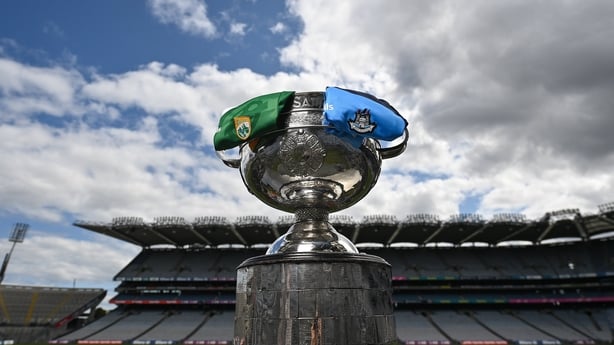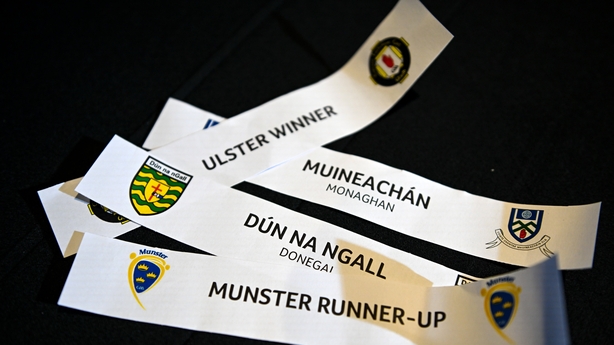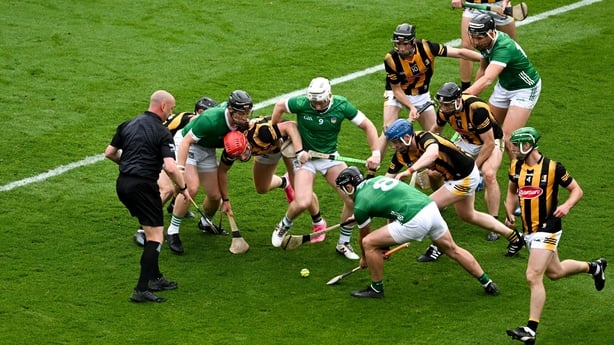2023 was the year generative artificial intelligence went global.
The likes of ChatGPT and Midjourney became everyday tools for millions of people, from students too lazy to write their own essays* to visual pranksters putting the Pope in a puffer jacket. Presumably there were also some more worthwhile uses.
But rather than sit at home arguing about whether we'll end up inside the Matrix or fighting Terminators we decided to harness the power of AI to tackle that great enigma of Irish sporting life: The Gaelic Athletic Association. Great minds have grappled with the questions facing the GAA for almost 130 years now and it often feels like we are no closer to answers. But maybe AI can help?
We started Chat GPT off with a few easy ones. Questions and answers have in some cases been slightly edited for clarity/devilment.
Do Kerry only travel for finals?
While major finals attract a significant number of Kerry fans, the team enjoys consistent support throughout the season, both in local and national competitions. The dedication of Kerry fans extends beyond just finals.
We believe you.
Are they born with a hurl in their hand in Kilkenny?
The saying 'born with a hurl in their hand’ is a figurative expression, not meant to be taken literally. It emphasises the strong cultural connection to hurling in places like Kilkenny, where the sport is deeply ingrained from a young age.
Glad you cleared that one up.
Do they know what a football is?
While Gaelic football is also played in Kilkenny, it doesn't have the same level of prominence as hurling. So, yes, people in Kilkenny are familiar with Gaelic football, but the county is more prominently associated with its achievements and passion for hurling. The sport of hurling holds a special place in the hearts of Kilkenny residents, and the county is traditionally a stronghold in hurling competitions.
Fair enough.

But isn’t Thurles the real home of hurling?
Thurles is often referred to as the "spiritual home of hurling". While it may not be the official or literal home of hurling, the town holds a special significance in the history and culture of the sport in Ireland. Thurles is home to Semple Stadium, one of the most iconic and historic venues for hurling matches. Hurling itself is deeply ingrained in Irish culture, and certain towns and venues, like Thurles, are considered hallowed grounds for the sport.
Very diplomatic.
Why do they call it camogie and not hurling anyway?
Camogie and hurling, though similar, are distinct sports. Camogie has its own rules, developed separately for women, and is governed by the Camogie Association. While both have common origins, they evolved separately to accommodate the characteristics of each sport and its players.
And shouldn't it be 'women's' football not 'ladies'?
The choice between "ladies football" and "women's football" depends on cultural and organisational preferences. In the context of Gaelic games, "ladies football" is traditionally used within the Gaelic Athletic Association (GAA). However, in other sports and contexts globally, the term "women's football" is commonly used to refer to the female version of the sport. The decision on whether to use "ladies football" or "women's football" may vary, and it is often a matter of respecting the established terminology within a particular sporting community or organisation. Both terms aim to highlight and promote the female version of the sport.
A most ladylike response. The long-anticipated amalgamated association (the TBA?) will sort all that out surely.
Why won't they let the ball in?
Gaelic footballers may not let the ball in for various reasons, including defensive strategies, possession control, tactical considerations, and responding to the scoreline situation. The decision depends on the dynamics of the game and the team's overall strategy.
Do you do a bit of coaching yourself?
Will Galway bate Mayo?
The question of whether Galway will beat Mayo in a GAA match depends on when the match takes place and various factors such as team form, player performance, and strategy on the day of the game.
No way, seriously?
What do you think of that Joe Brolly?
Joe Brolly is a former Gaelic footballer and sports analyst known for his candid and often outspoken commentary on Gaelic games. His analysis has been both praised and criticised, with some appreciating his frank and insightful observations, while others find fault with his controversial or confrontational style.
Indeed.
Does John Mullane love his county?
John Mullane is a former hurler from Waterford, Ireland, and is widely regarded as one of the county's greatest players. Love for one's county is often a strong sentiment among athletes, but specific personal feelings would be known only to John Mullane himself.
Incorrect. See his interview with RTÉ Sport after the 2004 Munster final.
Does he owe Waterford anything?
During his hurling career, Mullane gave a significant amount to the Waterford team and community. It suggests that he has fulfilled his responsibilities and made substantial contributions, and therefore, there may not be any lingering obligations or unmet expectations.
Dead right.
Are GAA managers paid?
The majority of GAA managers are not paid for their managerial roles at the inter-county level. Managing a county team in Gaelic football or hurling has traditionally been considered a voluntary position, and managers often take on the role out of a passion for the sport and a desire to contribute to their local community. However, it's worth noting that there have been discussions and debates within the GAA community about the possibility of providing financial compensation to inter-county managers. Some argue that recognising the time and effort managers dedicate to their roles could be a positive step, while others emphasise the amateur ethos of the GAA and the volunteer nature of managerial positions.
Hmm. Funnily enough, this is the same answer the taxman usually receives. Sure it's all expenses lads.
How was that not a free ref?
Referees make split-second subjective judgments, and factors like advantage, player actions, and human error can contribute to perceived discrepancies in the application of rules. Disagreements over referee decisions are part of sports, and concerns can be addressed through official channels. Disagreements are inherent in the game, and the GAA provides channels to address concerns through its disciplinary and appeals processes.
We won’t get started on the disciplinary process, we’d probably break AI altogether.
Is Jim McGuinness the messiah?
No, Jim McGuinness is not the messiah. The term "messiah" typically refers to a savior or religious figure, and it is not applicable in the context of sports or any individual, including Jim McGuinness. In the realm of sports, particularly Gaelic football, McGuinness is known for his accomplishments as a coach and manager, notably leading the Donegal team to All-Ireland success in 2012. However, it's important to use such terms judiciously and avoid attributing religious or messianic connotations to individuals in the context of sports achievements.
Sorry Jim.

Is Croke Park Dublin's home ground?
Croke Park, situated in Dublin, serves as the primary home ground for both the Dublin Gaelic football and hurling teams. This iconic stadium, being the largest in Ireland, holds historical and cultural significance in Gaelic games. Dublin teams often play crucial matches, including home fixtures in major championships, at Croke Park. While it is their principal home ground, teams may also play matches at other venues, especially during the earlier stages of competitions.
Ah god, you’re getting us in trouble now. It is, of course, Parnell Park, nudge nudge, wink wink.
Let’s move swiftly on and pose some more philosophical questions…
Is league league and championship championship?
The phrase "Tis only the league?" is often used colloquially in the context of Gaelic games, such as Gaelic football and hurling. It reflects a sentiment that suggests a somewhat dismissive or less intense attitude toward league competitions compared to championship competitions.
In this context, the question implies a rhetorical acknowledgment that the ongoing competition is "only the league" and may be seen as a period of experimentation, development, or a less critical phase in the overall season. Teams might approach league matches with different priorities, such as trying out new tactics, giving playing time to less-experienced squad members, or building team cohesion.
The phrase captures the idea that the league, while important in its own right, may not carry the same weight or significance as championship competitions, where the pressure is often higher, and success is typically more coveted. However, the interpretation of this phrase can vary, and some teams may still place significant importance on performing well in league competitions as part of their overall season strategy.
Should the ref let the game flow?
The question of whether a referee should adopt a more lenient approach, allowing the game to flow without frequent stoppages, or opt for strict officiating is a matter of consideration in Gaelic games. Some argue that a more permissive style enhances the excitement and natural rhythm of the game, contributing to a dynamic experience for players and spectators. On the other hand, proponents of strict officiating emphasise the importance of rule adherence for fair play, player safety, and maintaining a consistent and level playing field. The balance between these approaches often depends on the officiating team's philosophy, the nature of the match, and the expectations set by governing bodies. Striking the right balance is a nuanced aspect of refereeing, requiring careful judgment and consideration of the game's context.
Should Dublin GAA be split in two?
The question of whether Dublin GAA should be split into two separate teams is a matter of debate within the GAA community. Proponents of splitting Dublin argue that it would promote greater competition and fairness, allowing other counties a better chance of success. They believe it would lead to a more level playing field and a more diverse representation in terms of regional teams. Opponents of splitting Dublin often cite the success of the Dublin football team as contributing positively to the popularity and growth of Gaelic football. They argue that the dominance of Dublin has brought attention and resources to the sport, contributing to its overall development.
Ultimately, this is a complex issue with varying opinions. Any decision to split Dublin GAA would involve careful consideration of the potential impacts on competitiveness, local communities, and the broader landscape of Gaelic games. It would require a comprehensive evaluation of the consequences for players, clubs, and the sport as a whole. The decision would be made by the GAA authorities, with input from stakeholders and the broader GAA community.
Should all inter-county games be free to air?
The question of whether all GAA matches should be free to watch on TV involves balancing the goal of maximising viewership and community access with the financial needs of the GAA. Arguments for free TV access emphasise broader audience reach and community engagement, while considerations for broadcast revenue highlight the financial support necessary for the organisation's sustainability and development initiatives.
Thoughts Cork hurling fans?
Does the GAA not have enough money already?
While the GAA generates revenue through various means, such as ticket sales, sponsorships, and broadcasting rights, its commitment to amateurism and community values is a core principle. The organisation reinvests much of its revenue into supporting local clubs, developing facilities, and promoting youth participation in Gaelic games.
However, like any sports organisation, the GAA does face financial considerations, especially in terms of funding grassroots initiatives, maintaining facilities, and organising events. Balancing the financial aspects with the promotion of amateurism and community engagement is an ongoing challenge for the GAA.
In summary, while financial considerations are part of the GAA's operations, it is not accurate to say that the GAA only cares about money. The organisation places a significant emphasis on preserving the ethos of amateurism, fostering community engagement, and promoting Gaelic games and Irish culture.
Okay, let’s get more creative to wrap things up. Write a half-time motivational team-talk.
"Team, listen up. They wrote us off, tried to ban our best player. But let me tell you, that's their mistake. It's a sign of fear. We're not just players; we're the pride of this village.
"Prove them Wrong: They're doubting us, underestimating what we can do. But we define our destiny. This game is ours to win. Remember where you come from, the jersey you wear, and play like the warriors you are.
"Unity and Pride: Let's show them the strength in unity, the pride in our hearts. The doubters are just background noise. Play for each other, play for the village. On three: [Team shout]. One, two, three! Pride!"
Serious pride. We’re welling up.

Propose a new format for the All-Ireland Gaelic football championship that retains the existing league [not the provincials, because they are a waste of everybody’s time except Ulster].
1. Regional Qualification
Maintain the four current divisions (Divisions 1, 2, 3, and 4) of the Allianz Football League. Each division represents a region for the purpose of the All-Ireland championship.
b. Round-Robin Stage: Within each division, teams play a round-robin series of matches against each other during the league season.
c. Qualification Criteria: The top two teams from each division qualify for the Divisional All-Ireland Championship. This ensures representation from each division and encourages competitive balance.
2. Divisional All-Ireland Championship
a. Knockout Stages: The eight qualifying teams enter a knockout stage, with quarter-finals, semi-finals, and a final. Matches take place on a neutral ground to enhance fairness.
b. Promotion and Relegation: The top-performing team from a lower division gains promotion to a higher division for the following league season. The bottom team from a higher division faces relegation.
3. All-Ireland Super 8s
a. Top Teams Advance: The top two teams from the Divisional All-Ireland Championship join the top two teams from the previous year's All-Ireland Super 8s.
b. Round-Robin Format: The four teams play a round-robin series of matches, ensuring each team faces every other team.
c. Semi-finals and Final: The top two teams from the round-robin stage advance to the semifinals, followed by a final to determine the All-Ireland champion.
4. All-Ireland Qualifiers
a. Remaining Teams: Teams that did not qualify for the Divisional All-Ireland Championship enter the All-Ireland Qualifiers.
b. Knockout Stages: A knockout format determines which teams advance to the next round.
c. Relegation: The bottom team from the All-Ireland Qualifiers faces relegation to a lower division for the following league season.
So, let us this get straight. In 2023, that would have meant only Mayo, Galway, Derry, Dublin, Fermanagh, Cavan, Sligo and Wicklow contesting the ‘Divisional championship’, with the top two teams from that joining Kerry and Galway from the year before in a four-team round-robin stage inexplicably called the Super 8s, which is even more irrelevant than its old namesake as all four would play in semi-finals anyway. And there would be ‘Qualifiers’ for everybody else that go nowhere. Wow. We’re starting to get nostalgic for the days of Plan B.

One last try to redeem yourself ChatGPT, write us a poem about hurling.
With ash in hand and sliotar on ground,
The game of hurling doth astound,
A sport of skill, speed, and might,
Played with passion day or night.
The roar of the crowd, the clash of the ash,
The rush of the players, the lightning-fast dash,
As they battle for glory on the green,
In a game unlike any other you've seen.
From the puck of the ball to the final score,
The players give it their all and more,
For the pride of their county and their team,
In a game that is more than just a dream.
So let the sliotar fly, let the players run,
Let the battle be fought, let the game be won,
For in hurling, there is no greater thrill,
Than the sound of the crowd when the team fulfills.
Marty Morrissey would be proud. Happy New Year Gaelic games fans.
* (Or journalists writing Christmas features)


